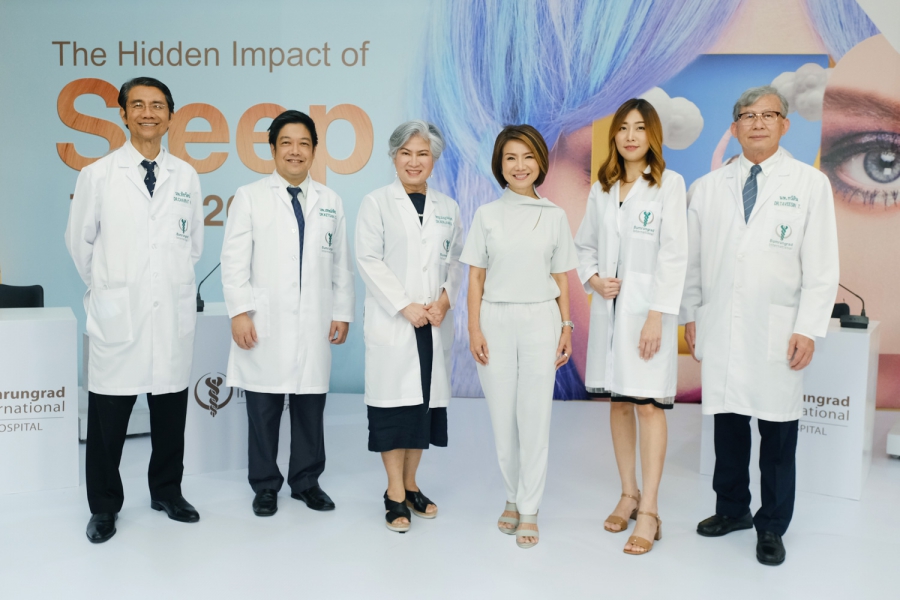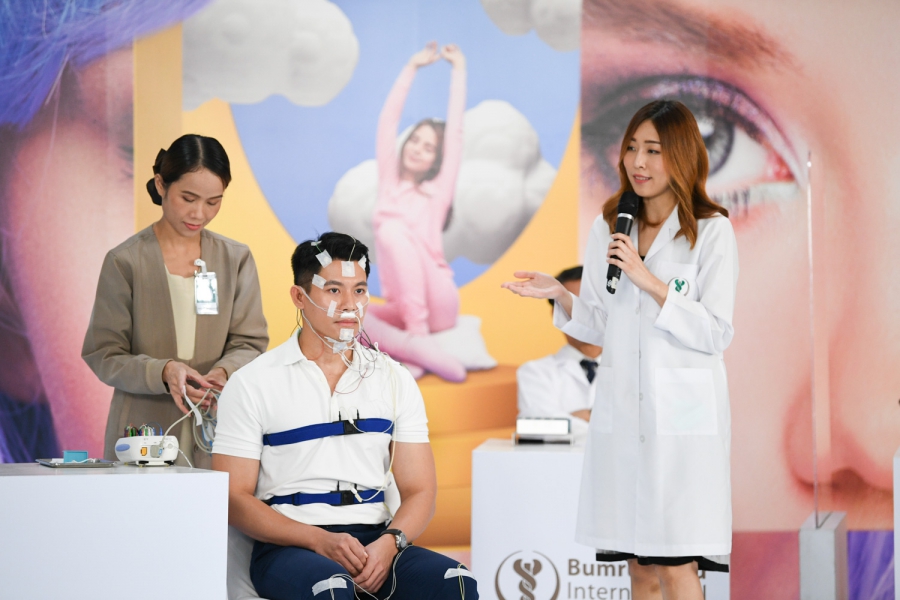Many might view sleeping problems as merely a small issue. However, in actuality, sleep occupies a third of our lifetimes and getting high quality sleep has many positive benefits. It aids the body’s restorative functions and re-balances hormone levels. Statistics from the Sleep Foundation (USA) show 30% – 48% of senior citizens have some trouble sleeping. Other surveys show 30% – 40% of Thai people, or 19 million people, experience problematic sleep. Medical research also shows that poor sleep will negatively affect overall health and well-being, making people more susceptible to dangers like coronary disease, hypertension, diabetes, and depression. Lack of sleep also increases risk of accident and lowers quality of life.
Pharmacist Artirat Charukitpipat, CEO of Bumrungrad International Hospital stated the vision of Bumrungrad aims to significantly increase our patients’ quality of life. In the past we have seen that Bumrungrad has relentlessly pursued increased excellence, as evidenced by our numerous centers of excellence at the hospital and the doctors and medical professionals who staff them. Further, Bumrungrad is has been a leader in bringing medical innovations into appropriate use by the whole hospital. Bumrungrad aims to provide holistic medical care for the most effective results. Our patients are key in formulating our policy, which establishes international standards of healthcare in Thailand.

The Grand Opening of the Bumrungrad Hospital Comprehensive Sleep Clinic will be accompanied by the Hidden Impact of Sleep press event. We believe the clinic will be relied on to help our clients increase the quality of their sleep and improve their quality of life. Sleeping troubles can originate from a variety of physical, mental, or environmental conditions. Further, sleeping troubles affect particularly those with chronic or undiagnosed complex health conditions. Hence, the Comprehensive Sleep Clinic can precisely diagnose and treat the underlying cause of our patients’ sleeping problems. Importantly, if the examination at the Comprehensive Sleep Clinic uncovers additional diagnoses or health problems, Bumrungrad can initiate treatment immediately, seamlessly, and with professionalism of our specialists and interdisciplinary healthcare teams– so our patients can receive the most efficacious treatments possible.
Dr. Ketchai Suavansri, Senior Associate Chief Medical Officer and Neurologist of Bumrungrad International Hospital, stated the Comprehensive Sleep Clinic seeks to comprehensively address all sleeping problems – beginning with patient interview and examination to find the cause of each patient’s sleeping issues. Once diagnosed, the underlying cause can be treated as appropriate by our team of doctors and medical specialists, which include such specialties as sleep science, pulmonology, ENT, neurology, dentistry, psychiatry. Together, we use internationally accepted standards of integrated medicine to examine, precisely diagnose, and comprehensively treat our patients sleep-related conditions.
Groups who are at-risk or should consult a doctor include:
People who have chronic conditions, like coronary disease, kidney failure, hypertension, diabetes, Alzheimer’s Disease, obesity or a BMI greater than 30. Fifty percent of people with such chronic conditions state they also suffer from sleep apnea.
People who are at-risk of sleep apnea.
People who have chronic sleepiness or fatigue throughout the day.
People who feel like they haven’t rested after a full night’s sleep more than 3 times per week over a 1-to-3-month period should see a doctor for examination. Also, those who are unable to do their normal daily activities or suffer from emotional imbalance or depression should also consult a doctor.
Dr. Benjamas Intarapoka, Pulmonologist & Doctor of Sleep Medicine at Bumrungrad International Hospital, stated the sleep problems seen most often at the Comprehensive Sleep Clinic are sleep apnea and insomnia. When first meeting a patient, doctors will conduct a patient interview and examination to diagnose sleep problems. Often, the examination will include a sleep study, which is the gold standard, producing the most precise diagnoses. The sleep studies are conducted in a dedicated space at the hospital and require one night to complete. During the sleep study, staff will monitor the patient continuously as they sleep, allowing for the most accurate observations of the patient to contribute to an accurate diagnosis of the patient’s actual condition, which in turn allows for the creation of an effective treatment plan.
The computerized sleep study has three principal parts:
EEG, which measures brain wave activity; EOG, which measures eye movement; EMG, which measures muscle movement; ECG, which measures cardiac activity. These measures help to tell doctors whether the patient is sleeping deeply or lightly, if the sleep cycle is normal or not, or if the sleep is of sufficiently high quality.
Respiratory monitoring will show if the patient is breathing normally or if breathing is too shallow. It will also show if a patient stops breathing while sleeping, as in sleep apnea.
Blood oxygen saturation monitoring shows if enough oxygen is being received into the blood. If a patient stops breathing while sleeping it will result in very low blood oxygen levels, which is a risk factor for deadly organ failure.
Presently in the treatment of sleep apnea, 95% of doctors worldwide prescribe the use of a CPAP machine to their patients because it is considered the most effective treatment. It works by providing positive pressure to keep the patient’s airway open while sleeping and preventing sleep apnea. Use of the CPAP machine is non-surgical treatment for snoring and sleep apnea no matter the severity – allowing users to stop snoring, stop their sleep apnea, and return their sleep quality to normal levels. After starting treatment, user sleep quality will increase, allowing them to sleep through the night uninterrupted, and feel the restorative effects of proper sleep again, which include improvements in mood, memory and concentration. CPAP treatment can also have positive affects on other pre-existing conditions, like hypertension, and diabetes – making blood sugar levels easier to control, aiding weight-loss because good quality sleep helps the metabolism and balances the body’s systems. Lastly, CPAP treatment can help to prevent other health conditions, like heart disease or stroke.
Dr. Darakul Pornsriniyom, Neurologist & Doctor of Sleep Medicine at Bumrungrad International Hospital, spoke about some interesting statistics and reported that people who experience sleep apnea have 3 times the risk of stroke over the next decade, if left untreated. Accordingly, other research suggests those who have suffered ischemic or hemorrhagic stroke have a 50% – 90% likelihood to experience sleep apnea over the next 10 years, if not treated with CPAP. Also, their risk of another stroke, heart disease, diabetes, and hypertension will increase due to 3 key factors: 1.) low oxygen levels while sleeping; 2.) a poor sleep cycle leads to less restful brain wave activity that is akin to waking; and 3.) changes which occur in the heart and circulatory system because episodes of sleep apnea cause hypertensive periods and an increase in pulse rate, until breathing is restored. Also sleep apnea can cause arrhythmia, as the heart must beat harder to keep the brain supplied with oxygen. As this happens many times each night, and over a long period of time, these events can lead to significant changes to the heart and circulatory system.
Nevertheless, sleep apnea will increase in severity when comorbid with obesity and age, with menopausal women (50-55 years old) also being at elevated risk. The increased estrogen in younger women helps keep their airways strong. However, the reduced estrogen levels in menopausal or post-menopausal women makes their airways more likely to collapse during sleep, causing sleep apnea.
Prof. Dr. Chairat Neruntarat, Otolaryngologist (ENT) & Doctor of Sleep Medicine at Bumrungrad International Hospital, added that people suffering from sleep-related conditions while experiencing other symptoms, like insomnia, teeth-grinding while asleep, restless leg syndrome, sleep-talking or sleepwalking, narcolepsy, unusual daytime sleepiness or fatigue, or juvenile insomnia. Bumrungrad has a comprehensive team of doctors, representing a multitude of specialties, who stand ready to find and treat the causes of your sleeping problems by ensuring that, after thorough examination, your treatment is overseen by a specialist appropriate to your case – ensuring you receive the most effective treatment and care. For example, if we have a juvenile patient unable to wear a CPAP, including those who might have allergies, a deviated septum, sinus infection, facial abnormalities, or a soft palette, an abnormality of the uvula, we will be referred to the Ear, Nose and Throat Center, the Dental Center, or the Behavioral Health Center, before being re-evaluated. Our treatment options include medications for insomnia, radio frequency, laser, adenoidectomy, tonsillectomy, oral appliance or Cognitive behavioral therapy for insomnia. Then, if the patient still experiences sleep apnea, we can initiate further treatment with a CPAP device.
For further information, please visit the Bumrungrad Hospital Comprehensive Sleep Clinic on the 12th Floor of Building A (Clinic Building) or contact us via phone: +6620112988 or by dialing 1378.


